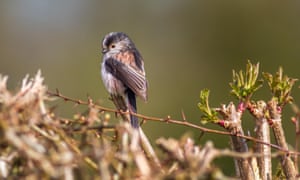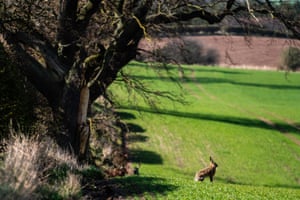The Wildlife Trusts, National Trust and RSPB have assured the public that their nature reserves remain open for people to walk in and enjoy as nature springs into life.
Research shows that time spent in nature is beneficial for mental and physical health, and current government advice on coronavirus is that people without symptoms or health vulnerabilities can go for a walk outdoors if they stay the recommended two metres away from others.
People have been using the hashtags #everydaywildlife and #solaceinnature on Twitter to share uplifting images. Hetty Upton, an outreach officer at the University of Exeter, tweeted: “Tadpoles in my pond are clearly ignoring mass gathering restrictions!”
Hetty Upton
(@hetty_upton)Research shows that nature is good for our health & wellbeing, so I am enjoying a garden stroll when I need a screen break whilst working at home. Tadpoles in my pond are clearly ignoring mass gathering restrictions! ? #EverydayWildlife #Naturehood #PositivePosts @WildlifeTrusts pic.twitter.com/gZszwnbM4B
The Wildlife Trusts run 2,300 nature reserves in the UK, which remain open although some visitor centres are now closed. “They provide excellent places to unwind and take in the fresh air away from crowds,” said Jo Richards, of the trusts.
“During this difficult time it is more important than ever to maintain a connection with the natural world,” she said. “Research conducted for us by the University of Essex shows that time spent in nature can lead to enhanced feelings of positivity and increased general health, including improved mental wellbeing. Whether you watch long-tailed tits seek out nesting spots or stop and notice violets, these moments can bring joy and help relieve stress.”

All of the National Trust’s nature reserves are open, as well as gardens and parklands where there is sufficient space for people to walk separately, and entrance fees have been waived. However, houses, cafes and shops will all close by Friday.
“The National Trust was founded 125 years ago for the benefit of the entire nation. We want to honour our mission: to enable people and nature to thrive,” said its director general, Hilary McGrady.
The RSPB has 220 nature reserves and said it was keeping as many of them open as possible for as long as possible, with car parking charges waived, though all visitor centres, cafes and shops are now closed.
“Nature has a remarkable way of restoring calm,” Beccy Speight, the charity’s chief executive, said in a statement. “As I write this, I can hear songbirds calling and see a pair of blue tits in my garden getting busy nest building – clear signs of spring and of wildlife busying itself in readiness to raise chicks.”
English Heritage has closed all its staffed sites but its free-to-enter sites remain open. “England’s past is full of stories of hope in the face of adversity,” said its chief executive, Kate Mavor. Similar decisions have been made by the equivalent organisations in Scotland and Wales.
Prof John Middleton, president of the Association of Schools of Public Health in Europe, said people observing the government guidelines should go for a walk. “It is absolutely essential for people’s mental health and should be perfectly safe as well,” he said. “There is a lot of evidence that exercise in a green environment is better for people’s physical and mental health, instead of exercising indoors.”
Research published last year showed that a two-hour dose of nature a week significantly boosted people’s health and wellbeing, even if they simply sat and enjoyed the peace. The University of Essex’s study found that volunteers on wildlife projects benefited from a big boost to their mental health.

The government’s current guidelines on social distancing say that anyone with symptoms or in poor health should not leave their home. For the rest of the population it says: “You can go for a walk outdoors if you stay more than two metres from others.”
Professor Martin Marshall, chair of the Royal College of GPs, said: “While self-isolation and social distancing are both vital measures to help combat the spread of Covid-19, they could inevitably have repercussions on people’s health due to inactivity and the impact of loneliness. Getting out and about is something that should benefit people’s physical and mental health and wellbeing.”
The Wildlife Trusts said those unable to venture far from home could still benefit from nature by downloading identification sheets to spot wildlife from a window or putting up bird feeders.
Others are sharing images, videos and poems of nature online. Hannah Kwaja, a field conservation assistant at Chester Zoo, tweeted: “Lunchtime leg stretch down to the river … listening to the birdsong, watching cormorants and herons fish is bliss.”
The Wildlife Trusts, National Trust and RSPB recommend people check online for opening information about specific sites.